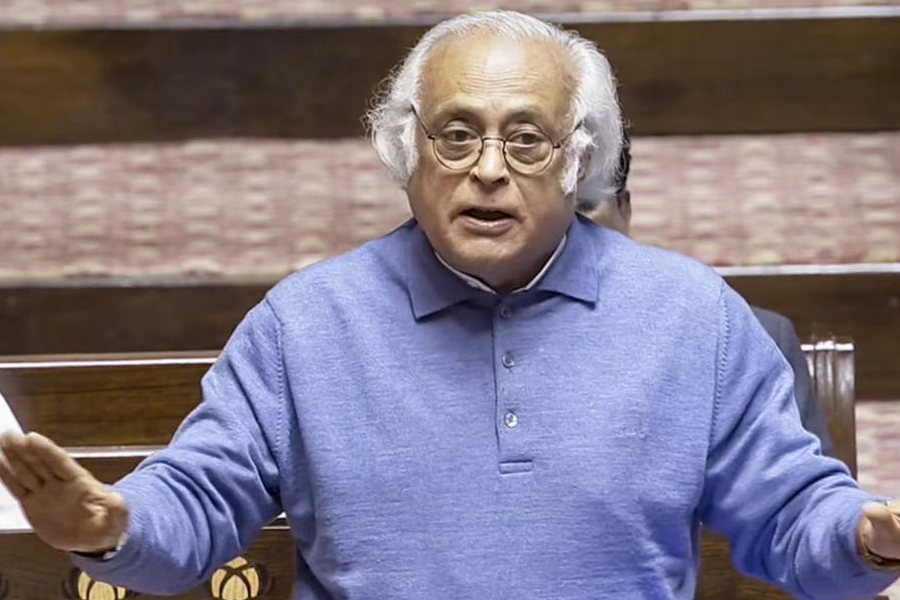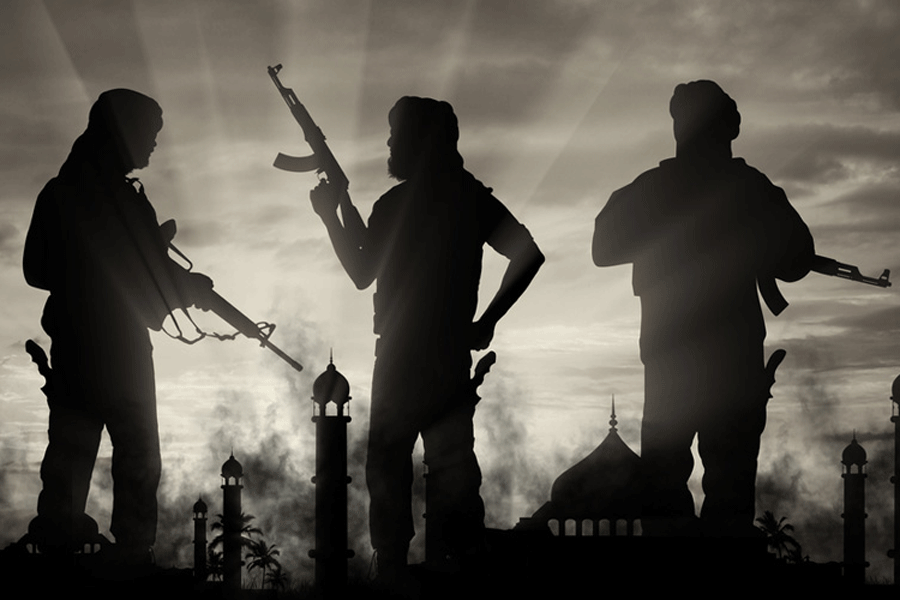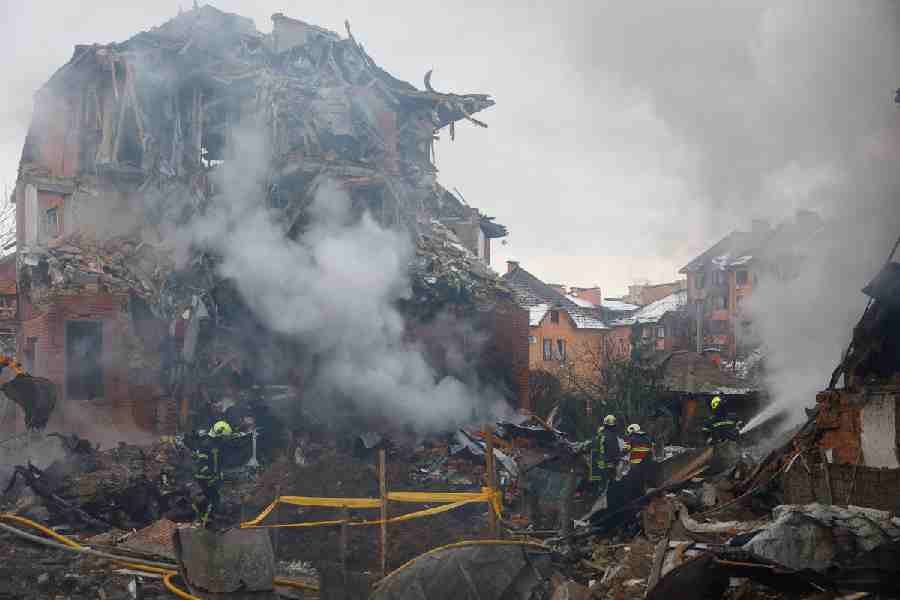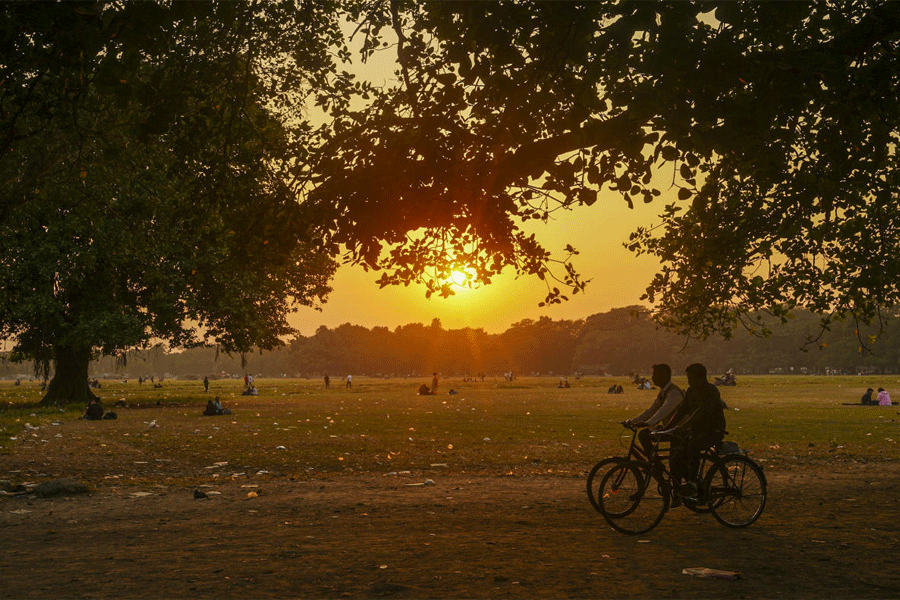 |
 |
 |
 |
| Siliguri burns after unfounded rumours of hooliganism by supporters of Indian Idol 3 winner does the rounds, the five elephants that were struck down by lightning, snow in Darjeeling on Valentine’s Day and Prashant Tamang with John Abraham. Pictures by The Telegraph, Main Uddin Chisti and Suman Tamang |
Certainly not Dickensonian but 2007 was probably “the best of times, the worst of times”. It was a year that started with “freak (snow) flakes”, an electronic giant rolling out goods from a jam and jelly unit and the casino coming closer home and a “hill-grown” Indian Idol. Life was pleasant till a little girl lost her life to an avalanche of garbage and empty promises kept eluding closed gardens. Then followed blasts and riots interspersed with achievements and tales of successes, deaths and protests, promises kept and resolutions broken.
But now that the end is near, here is the rear-view:
Feb. 5: A blast rips through Kamakhyaguri station, four minutes after the UP Kamrup Express leaves Platform 2, in the afternoon. The explosion injures three persons. Investigation points to Ulfa hand.
Feb. 14: Darjeeling says Valentine’s Day with snow. The hill town wakes up blanketed in four inches of stunning white overnight snow — the heaviest in recent times. The last time it snowed on Valentine’s Day was in 1985, residents of the town claim.
Feb. 18: With its name changed to Kitchen Appliances India Limited, a wholly-owned subsidiary of the Videocon Group, Kanchan — a food processing unit once owned by the Bengal government — starts producing electronic goods. The staff of Kanchan is absorbed and trained for the new job.
Feb 25: A huge morass of debris slithers downhill from the dumping chute of Darjeeling to bury alive a 10-year-old girl. An aghast governor of Bengal is at a loss when told that the tourist town has no solid waste management.
Feb. 27: Six persons die two days after consuming spurious liquor at a bar-cum-restaurant near Balurghat station on Sunday night. Seven others taken to the district hospital in critical condition.
March 1: A MiG 21, piloted by Squadron Leader Swapna Sunder Pandey (28), crashes 1,000ft above Shibkhola, 35km from Siliguri. The incident comes a few days after Bagdogra airbase is declared the best base in the Eastern Air Command and an IAF declaration that the ageing MiG 21 is a “safe aircraft”.
March 2: Four senior officials, including the Bengal’s director-general of police A.B. Vohra, are convicted by Calcutta High Court that ordered them to break a month-long siege of the Jalpaiguri district court. A Congress MLA, the district magistrate and superintendent of police of Jalpaiguri, and an officer-in-charge are among the rest of the unusual names on the list of the 18 accused. The state administration’s inaction amounted to “direct assistance” to the agitators in Jalpaiguri, the two-judge division bench says. The protesters were demanding a high court circuit bench in Jalpaiguri.
March 11: Five policemen from Sikkim are shot dead by one of their India Battalion colleagues in Delhi after there is an alleged attempt to sodomise him while on duty at a Dena Bank branch. The accused is also a Sikkimese.
April 3: More than 500 houses are gutted and a number of cattle heads killed, when a fire destroys two villages in Ratua, Malda.
April 3: Bengal finance minister Asim Dasgupta declares a special grant of Rs 16 crore for the closed tea gardens of the Dooars belt for the next three months.
April 11: An elephant is run over by a Guwahati-bound goods train at Garopara in Kalchini block near Alipurduar, Jalpaiguri district.
May 4: Five elephants are found dead on the dried up riverbed of the Raidak, a kilometre from New Land Tea Estate in Alipurduar, early in the morning. Forest officials say the animals — two calves, a sub-adult female, one adult female and an adult male — were struck by lightning when heavy rain lashed the Kumargram area of Jalpaiguri district around 3am.
May 8: Sikkim Manipal Institute of Medical Sciences is finally recognised by the Medical Council of India (MCI). The non-affiliation to the MCI had rendered courses at the institute useless and had in turn led to several flare-ups between students and the authorities in the past two years.
May 14: Las Vegas comes nearer home. Sikkim legalises casinos and tour operators feel that it is time to give Nepal a run for its money, literally. Kathmandu had so long been the biggest draw for tourist visiting the region and often the hill state lost out to it because of the absence of casinos.
May 22: The North Bengal Tea Auction Centre in Jalpaiguri is set to enjoy a waiver on central sales tax. This means buyers at this auction centre will get a three per cent waiver for the next two years. The waiver, which has come into effect from April 1, is likely to give Jalpaiguri an edge over Siliguri and Calcutta.
May 23: Darjeeling Gymkhana Club expels three members caught having sex with a woman in the card room. The club, a bastion of genteel manners, is rocked by scandal when the news came out. The governor of Bengal is the ex-officio president of the club.
May 26: Two persons are killed in a quake-triggered landslip in South Sikkim. As many as seven tremors, most of them between 3 and 5.5 on the Richter scale, are reported from several parts of the state.
June 14: The Centre threatens to invoke for the first time a 54-year-old law— Section 16 (D) of the Tea Act of 1953 — to take over three closed tea gardens in the Dooars. Junior commerce minister Jairam, Ramesh urges tea board to invoke 16 (D) in Raipur, Bandarpur and Sikarpur.
June 25: Air Officer Commanding-in-chief, Eastern Air Command, Air Marshal P.K. Barbora announces that the IAF has no objection to the upgrade of Bagdogra Airport for international operations.
June 29: The chief minister unveils the foundation stone of Videocon’s biotechnology project and an IT complex in Dabgram, 7km from the heart of Siliguri.
July 4: A 10m stretch of the toy train tracks is left hanging in the air when a portion of the hillside beneath it gives way. The landslip, which occurred between Tindharia and Rongtong stations around 4.30pm, misses the 2D, the Siliguri-bound Down train of the Darjeeling Himalayan Railway by an hour.
July 17: One person is buried alive while several others are injured as heavy rains hit Darjeeling district. A series of landslides strike the hills, one of them destroying the loco-shed in Darjeeling railway station. Two diesel and one steam engines are trapped under the debris, while a century-old 782B steam engine, parked outside the shed, is covered with mud.
June 18: A full-grown Royal Bengal tiger is found dead near the railway tracks at Baro Salmari, a village in Cooch Behar. The death comes on the heels of a national uproar over vanishing tigers from reserves, underscored by preliminary findings of a survey that paints a grim picture.
July 25: Another animal dies on tracks. This time it is a two-year-old elephant calf, straggling behind its herd. It is run over by an express train near Gulma station, which is located in the Mahananda Wildlife Sanctuary.
July 28: The Himalayan Mountaineering Institute (HMI) reaches its nadir with the army declaring its indefinite closure. (It, however, reopens on August 2) The stalemate is a result of a tiff between the HMI’s army management and a section of civilian employees. The civilian staff, under the GNLF-backed Hill Employees’ Association (N.B. Singh Road), wants to revert to a pre-1986 system in which only the principal, vice-principal and the doctor of the institution were from the army.
Aug. 22: A Bailey bridge whose wooden planks had been crumbling for months gives way at Domohona in North Dinajpur, plunging many into the swollen Sudani 40 feet below. Eight persons are pulled out of the river and one of them dies.
Sept. 23: Darjeeling boy Prashant Tamang is declared the new Indian Idol. Bollywood star John Abraham announces the results of the Indian Idol 3 final that had locked the two northeastern contestants’ home turfs— Tamang’s Darjeeling and Amit Paul’s Shillong—in a feverish race to vote by SMS and dial.
Sept. 28: Rumours of hooliganism by supporters of Indian Idol 3 winner Prashant Tamang leads to street riots in Siliguri, prompting police firing, army intervention and an indefinite curfew.
Oct. 1: The Union cabinet approves the Sixth Schedule status for the Darjeeling hills, almost two years after GNLF chief Subash Ghisingh signed the memorandum of settlement for the creation of a new council under it.
Oct. 7: Bimal Gurung, a former GNLF strongman, floats the Gorkha Janmukti Morcha. The party will for the next three months garner support against the Sixth Schedule status, so much so that the bill will have to be referred to a standing committee.
Nov. 9: A fully grown male elephant dies, more than 16 hours after it is hit by an engine near Rajabhatkhawa station, 18km from Alipurduar town.'
Nov. 23: Section 144 is imposed in Darjeeling as reports trickle in that a GNLF leader has been attacked by a mob— a result of a stand-off between Subash Ghisingh’ supporters and Bimal Gurung’s party, the Gorkha Janmukti Morcha. Army kept as standby. A spontaneous closure ends in an indefinite strike called by the GNLF from November 24.
Nov. 29: The GNLF calls off its indefinite strike, five days after the shutdown crippled normal life in the hills.
Nov. 30: The constitutional (amendment) bill for the inclusion of the Darjeeling hills in the Sixth Schedule is introduced in Parliament by home minister Shivraj Patil.
Dec. 4: The Centre agrees to send the Sixth Schedule amendment bill to a parliamentary committee, a move which comes as a big blow to Subash Ghisingh. For a bill to be sent to a parliamentary committee means it can be shelved for an indefinite period.
Dec. 9: More than 1,000 passengers of the 4055 DN Brahmaputra Mail have a miraculous escape when 14 of the 17 coaches jump tracks near Nijbari station, 15km from New Jalpaiguri, around 11.10pm. One pantry car employee dies.











